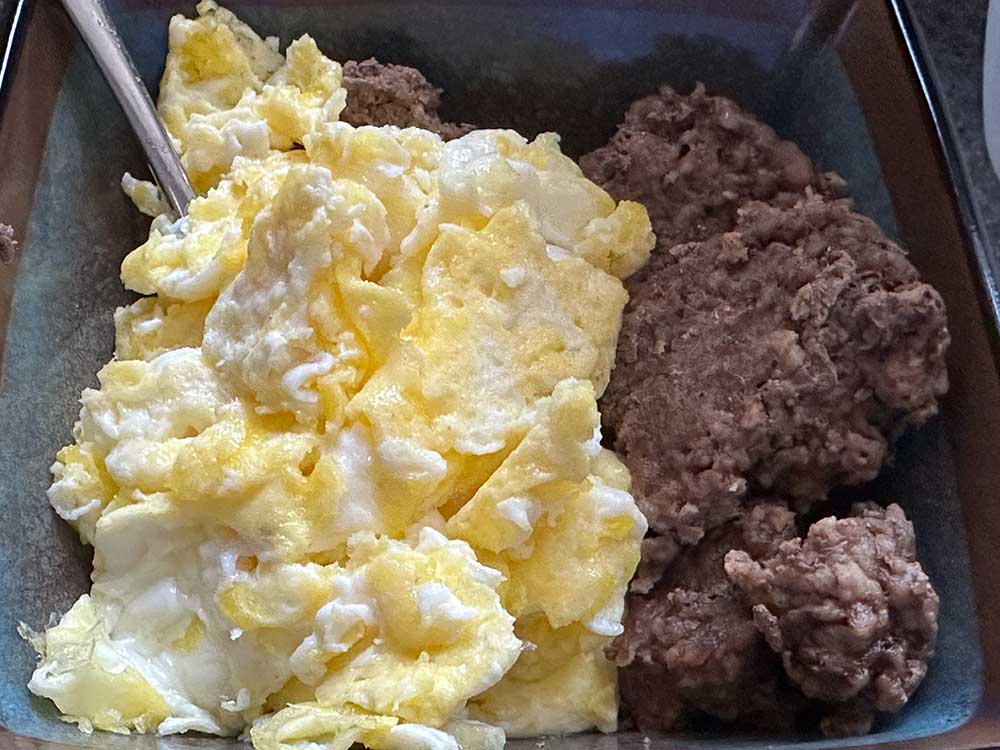Who's Afraid of Protein?

 Blog image created with Canva
Blog image created with Canva
Who's Afraid of Protein? - by Roxana Soetebeer
Protein is an essential macronutrient and plays a critical role in numerous body processes. We need protein to build and repair body tissue, support immune function, and regulate hormones.
So, if protein is crucial for health, why are diabetics afraid of it?
Why are T2 diabetics told to restrict protein to protect their kidneys?
Let's explore the need for protein, essential amino acids, and debunk the common misconception that protein causes kidney damage.
Proteins, made up of amino acids, are the building blocks of life. They play a vital role in various processes in our body, including synthesizing enzymes, hormones, and neurotransmitters. Proteins also help muscle repair and growth, support a healthy immune system, build bones, hair, skin, nails, and aid in nutrient and oxygen transport throughout the body.
Out of the 20 different amino acids that make up proteins, nine are considered essential amino acids. Essential means our bodies cannot synthesize these amino acids, so we must obtain them through our diet. Essential amino acids include histidine, isoleucine, leucine, lysine, methionine, phenylalanine, threonine, tryptophan, and valine.
When I post my meals in groups that focus on diabetes and nutrition, I often get pushback on my choices. I am told that diabetics are prone to kidney disease and that I should better limit my protein intake. These members firmly believe that protein damages the kidneys.




The idea that protein harms the kidneys primarily stems from people with chronic kidney disease spilling protein into the urine. However, the presence of protein in the urine is not a sign of excessive protein intake from the diet; rather, it indicates kidney damage. Since the body needs protein for optimal function, restricting protein will not protect the kidneys. People with kidney disease, too, need protein.
Numerous human studies have shown that moderate to high protein diets, including those from animal products, do not harm the kidneys. For instance, studies investigating low-carbohydrate, high-protein diets, and ketogenic diets, have found no adverse effects on kidney function.
Human study showing keto had no ill effects on kidney function:
Renal Function Following Three Distinct Weight Loss Dietary Strategies During 2 Years of a Randomized Controlled Trial
Human study showing High Fat, and even High Protein diet didn't harm kidney function:
Comparative effects of low-carbohydrate high-protein versus low-fat diets on the kidney
High-Protein Diet effect on Kidneys:
Changes in Kidney Function Do Not Differ between Healthy Adults Consuming Higher- Compared with Lower- or Normal-Protein Diets: A Systematic Review and Meta-Analysis
The final nail in the coffin on the high protein causes kidney disease hypothesis is this paper that lists 13 risk factors. High protein intake didn't make the list.
Risk factors for chronic kidney disease: an update
Protein can be immensely helpful with weight loss due to its satiety factor. It simply makes us feel full. Unlike carbohydrates or a combination of carbs and fat, it is challenging to overeat on protein—guzzling down protein shakes aside. Consuming protein triggers feelings of fullness and satiation—a sudden sensation of fullness during a meal. Even the thought of eating one more bite causes slight nausea.
But wait, there is more. Protein also triggers satiety, which is a feeling of fullness between meals, reducing the desire to snack or overeat.
During active weight loss, protein intake between 1.2 and 1.5 g/kg/day has been shown to provide greater satiety, weight loss, and fat mass reduction while preserving lean muscle mass compared to diets with lower protein content.
The role of protein in weight loss and maintenance
Now that we understand the significance of protein, let's discuss how to ensure we are getting enough in our diet. The recommended daily protein intake varies depending on age, gender, activity level, and overall health. The average adult is typically advised to consume 0.8 g/kg/day as the recommended daily allowance (RDA).
However, recent research suggests that higher protein intakes may be more beneficial, especially during weight loss. For instance, studies have indicated that a more adequate amount might be around 0.92 g/kg/day.
Lean Mass Loss Is Associated with Low Protein Intake during Dietary-Induced Weight Loss in Postmenopausal Women
This study suggests that dietary protein requirements are even higher at 1.2-1.5 g/kg/day.
Current Concepts and Unresolved Questions in Dietary Protein Requirements and Supplements in Adults
And this paper sets the optimal protein intake at 1.2-1.6 g/kg/day.
Protein "requirements" beyond the RDA: implications for optimizing health
Gluco-neo-genesis (glucose-new-creation) is the process in which the liver creates glucose from protein and sometimes from fat. The liver's ability to produce glucose keeps us alive between meals, throughout the night, and during fasting periods.
Fun fact: because of gluconeogenesis, humans do not need to consume any dietary carbohydrates.
In the keto community, there is the fear that overeating protein may cause a spike in glucose and knock individuals out of ketosis. But this is not how it happens.
In healthy people, gluconeogenesis is demand-driven, meaning the body will only create the needed glucose. It is not supply-driven. Eating more protein does not result in more gluconeogenesis.
Dietary Proteins Contribute Little to Glucose Production, Even Under Optimal Gluconeogenic Conditions in Healthy Humans
In T2 diabetics, this looks to be a little more complicated. The liver in T2 diabetics is compromised. It is insulin resistant. Does this mean that T2 diabetics must watch their protein intake so that excess protein is not converted into glucose?
In short, no.
When healthy people eat, insulin rises, signalling the liver to stop providing glucose. Since new fuel is coming in, there is no need for extra glucose. Unfortunately, in people with T2 diabetes, the liver is insulin resistant. It doesn't get the message. It keeps pumping out glucose because it is deaf to insulin signals.
Limiting protein intake does not help control glucose in T2 diabetics, as the excess glucose production is a result of insulin resistance rather than high protein intake.
I hope this helps to clear up some common misconceptions about protein.
Final thought: Protein is vital for human health, and animal products provide the best, most complete, and most bioavailable sources of protein.
Written by Roxana Soetebeer MHP
Published July 22nd, 2023
Social Media:
Facebook
Twitter Joy
Twitter Roxana
Keto Coaching now offered worldwide
Prof. Tim Noakes and 6 more

Ketogenic: The Science of Therapeutic Carbohydrate Restriction in Human Health
Dr. Ken Berry MD

Lies My Doctor Told Me Second Edition
Dr. Chris Palmer MD

Brain Energy: A Revolutionary Breakthrough in Understanding Mental Health--and Improving Treatment for Anxiety, Depression, OCD, PTSD, and More
Michelle Hurn RD

The Dietitian's Dilemma: What would you do if your health was restored by doing the opposite of everything you were taught?
Dr. Benjamin Bikman PhD

Why We Get Sick: The Hidden Epidemic at the Root of Most Chronic Disease - and How to Fight It

